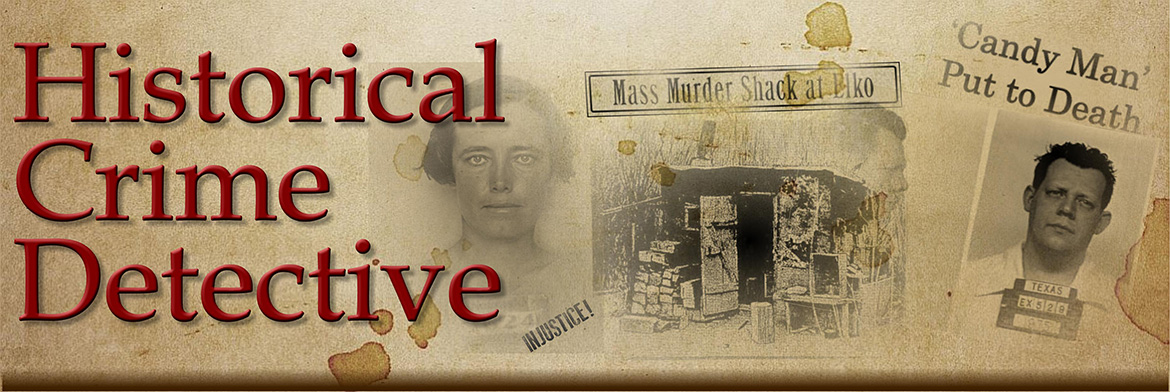The Murder of Dr. A.W. Powers, San Benito County, 1885.
Story by Thomas Duke, 1910
“Celebrated Criminal Cases of America”
Part II: Pacific Coast Cases
Dr. A. W. Powers was born in Vermont, where he studied medicine, and in 1855 moved to Bear Valley, about thirty miles south of Hollister, where he became a practicing physician. At the time of his death he was seventy years of age.
Although it was conceded that Powers was a first-class physician, he was exceedingly unpopular with many of his neighbors, and it was alleged that persons incurring his enmity were almost certain to have their stock poisoned, but in no instance was the proof against him strong enough to justify a prosecution.
On September 10, 1885, an incendiary fire destroyed considerable property belonging to John T. Prewett, a neighbor of Powers’ with whom he had had trouble, and many persons were morally certain that Powers started the fire.
To add to his unpopularity, the doctor boasted that he had evidence in his possession which would send some of his neighbors to State Prison for defrauding the United States Land Office by proving up falsely on their lands.
On September 17, 1885, Powers spent the day with the family of A. R. Severnean, leaving for his home, some three miles distant, about 5 p. m.
Nothing more was heard or seen of him until the following day, when some boy hunters found his body hanging to the limb of a tree about thirty yards from the Bear Valley road.
Sheriff B. F. Ross proceeded to the scene of the tragedy and found a gunshot wound in the man’s back, and an autopsy subsequently performed, showed that the man died from that wound and that the body was hanged after death. On the shirt of the dead man a piece of cardboard was pinned on which was written, “Vigilantes 150.” By certain marks on this piece of cardboard, Detective Jerome Deasy, of Harry Morse’s San Francisco Detective Agency, ascertained that it was torn from a corset box which came from Freud & Co., on Market Street, San Francisco.
Judging from the footprints near the scene of the hanging it was estimated that about six men participated in the deed.
As it was known that Prewett felt extremely bitter toward Powers, whom he suspected of burning his property, Henry Melindy, a nephew of the murdered man, swore to a complaint charging him and Andrew Irwin with the murder.
It was learned that immediately after the burning of Prewett’s property, written invitations were sent out to the neighbors to assemble at Irwin’s cabin to discuss ways and means to dispose of Powers. These invitations were in the same handwriting as that on the card pinned to Powers’ shirt. The names of all who attended this meeting were obtained and they were arrested. Among them were S. W. Alexander and his son Dick. When Alexander Sr. was arrested he broke down and stated that while he was present at the meeting he did not participate in the hanging, but that his son did. When confronted with this statement, Alexander Jr. made the following confession:
“Although the meeting was held, nothing definite was decided upon, but on September 17 I went to Prewett’s house about 7 p. m., when I saw Prewett ride up the road on horseback and he had a shotgun with him.
“After supper Prewett and I rode over to Irwin’s cabin where another meeting was to be held that night. On the way he told me that he was riding along the road that day, and coming upon Dr. Powers suddenly and unexpectedly, he ordered the doctor to throw up his hands. Powers was obstinate and Prewett shot him in the back. Powers fell from his horse and Prewett fired another charge into his back as he lay on the ground. He then dragged the body into the brush.
“When we arrived at Irwin’s cabin six or seven of our neighbors were there, and a regular meeting was held, Isaac Slavin acting as chairman. As soon as the meeting was called to order, Prewett described the incidents regarding the killing of Powers as already related to me, and then proposed that they go in a body and hang the remains to a tree, so as to give the impression that it was the work of a great number of people, who could no longer tolerate the presence of this trouble-maker. All present were agreeable to this plan and they then stood and, holding up their right hands, took a solemn oath of secrecy. It was further agreed that death would be the penalty to any one who broke faith.
“Slavin then took a piece of cardboard from his pocket and wrote thereon, ‘Vigilantes 150.’ We then proceeded to the spot where the body was concealed and after Slavin pinned the card on the shirt we hanged it to the limb of a tree.”
The detectives visited Freud & Co., the corset makers, and ascertained that the only corsets they had sent to any person in that part of the country was to Miss Slavin in Bear Valley. They identified the mark on the pasteboard as being one of the firm’s private marks.
All who were present at the meeting at Irwin’s cabin were held without bail, except one Stice, whose bail was fixed at $5,000.00, but on December 1 all of the other persons arrested in connection with the case were released on bail except Irwin and Prewett.
On February 15, 1886, Prewett’s trial began. In addition to Alexander, a great many other witnesses were produced. W. T. Smith, special agent of the Government Land Office, testified that Prewett had obtained government land under false representations.
W. T. Garner testified that Prewett had threatened to kill Dr. Powers and his nephew Melindy, and that Prewett stated that he had already killed two men in Colorado.
On March 2, while the trial was still in progress, the charges against all of the alleged conspirators who were out on bail, were dismissed, as it was the intention of the prosecution to use them as witnesses for the State, but when they were placed on the stand they refused to testify, and two of them were fined $500.00 each for contempt of court.
The case was submitted to the jury at 3 p. m. on March 15, but not being able to agree upon a verdict they were discharged on the 19th inst. after being out 90 hours.
It was then learned that when the first ballot was taken in the jury room, Juror W. P. Phillips said as he cast his ballot : “Here goes old Phillips for acquittal, and he won’t change his vote till doomsday.”
On April 1, Phillips was arrested on a charge of perjury in connection with answers he gave while being interrogated previous to being selected as a juror, but the charge was dismissed by Judge Hoffman. Four years afterward Phillips was burned to death in a fire at Fresno, Cal.
Prewett’s second trial began on June 7, but on July 1 the further hearing of the case was discontinued for the reason as the minutes of the court show “that it is impossible at the present time to procure a jury in this county.”
The case was then transferred to Monterey County, where the second trial began on March 5, 1888. The jury again disagreed and the case was dropped from the calendar.
On November 14, 1887, Andrew Irwin was placed on trial and on November 29 he was found guilty of murder in the second degree. On December 19 he was sentenced to San Quentin for life, but an appeal was taken to the Supreme Court and a new trial was granted after Irwin had served about one year in prison. As there seemed to be no disposition to prosecute the case any further, Irwin was liberated.
—###—



